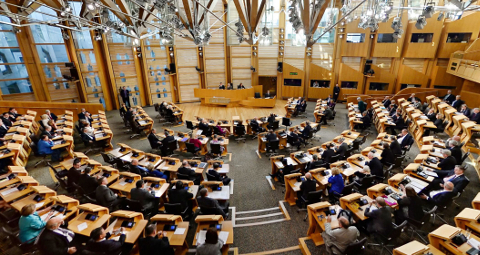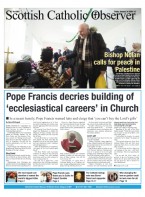BY Daniel Harkins | June 15 2018 | ![]() 0 COMMENTS
0 COMMENTS ![]() print
print

MSP accuses government of ‘treating Catholic and Irish community with contempt’
Publication Date: 2018-06-15
Labour’s James Kelly hits out over make-up of working group set up to define sectarianism
A Labour MSP has accused the government of ‘treating the Catholic community with complete contempt’ after a fractious parliamentary debate in which he urged the government to include a representative of the Catholic Church on a group set up to define sectarianism.
James Kelly MSP’s comments, which followed a parliamentary debate on Lord Bracadale’s independent review of hate crime legislation on June 7, have drawn a furious response from rival politicians.
Prior to the Bracadale review, the Scottish Government had established a working group to define sectarianism.
In April, the SCO revealed that the group contained no representative of the Catholic Church or Irish community, despite having two Church of Scotland ministers on the panel, and included a member who once mocked clergy as ‘actors in fancy dress.’ The group’s members were chosen without consultation with the Church or the Catholic or Irish communities.
Newly released figures show that in 2017-2018, half of all victims of religiously aggravated crime in Scotland where Catholic, despite Catholics making up less than 15 per cent of the Scottish population.
During last week’s debate, Mr Kelly said: “I welcome the setting up of [the sectarianism working group] because definitions are important… However, there is a real problem for the government in terms of membership of that group. There is no formal member of Roman Catholic Church.”
At this point, he was interrupted by the minister for community safety and legal affairs, Annabelle Ewing, who referenced a member of the group, Margaret Lynch, who runs a consultancy firm.
Mr Kelly continued: “The minister is saying Margaret Lynch — with all due respect to Margaret Lynch she is not an official member of Roman Catholic Church. By that I mean a bishop or priest or somebody appointed by the Church. I believe that to be a major flaw. I say this seriously to the minister: you really have to address the flaw in that group… you must properly involve an official member of the Roman Catholic Church.”
Fellow Labour MSP Rhoda Grant for the Highlands and Islands criticised the tone of the debate.
“I would ask the minister to look at this working group on sectarianism because there were concerns expressed about its membership,” she said. “If people don’t have confidence in the membership of that working group then they won’t have confidence in what it comes out with.”
At the end of the debate, Annabelle Ewing said: “I wish to clarify a matter with regard to the membership of the working group on sectarianism. Group members will be individuals who have a track record of involvement or legal expertise in tackling sectarianism; they will not be there to represent an organisation, be it a church or any other body. When the group has reached its conclusions, there will be full engagement, which will take place with all interested bodies, including churches.”
Speaking after the debate, Mr Kelly said: “The SNP is treating the Catholic and Irish communities with complete contempt and it is wholly regrettable that the minister has failed to include any representative of the Catholic Church on her working group.
“Despite raising this very point with her in the Scottish Parliament, Annabelle Ewing heckled me and failed to take the point seriously,” he added.
SNP MP James Dornan, who spoke during the debate about a cross-party group on sectarianism he has established, hit out at Mr Kelly on Twitter.
He wrote: “I’ll tell you what was disgusting, James Kelly using a debate about hate crime and how to combat it to play to what he considers his audience. I’ve just come back from a country brutally scarred by this kind of language and he should be utterly ashamed of himself.”
Asked about Mr Kelly’s remarks, a Scottish Government spokesperson said: “As the minister for community safety and legal affairs made clear in parliament on June 7, members of the definition group are participating as individuals because they have a track record of involvement in tackling sectarianism or legal expertise.
“They are not representing any organisations. When the group has reached its conclusions, there will be a full consultation on these which will be open to all interested parties including churches.”










